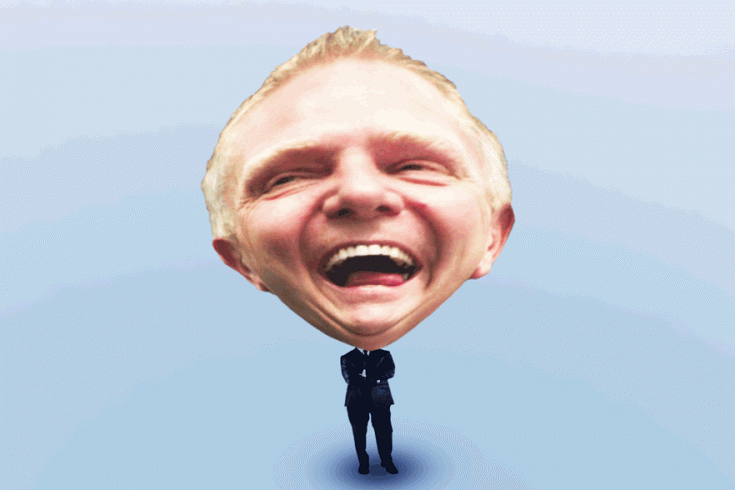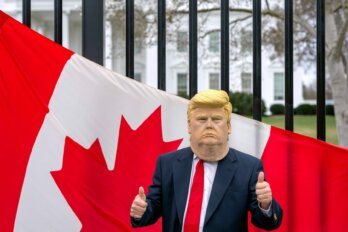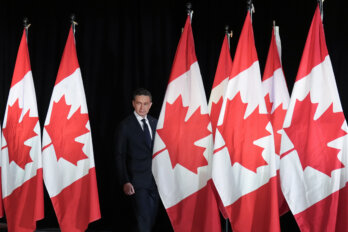Onstage, in the capital of Ford Nation, not far from the premier-designate’s house in Etobicoke, the man who is set to become the premier’s chief of staff was warming up the crowd. The Progressive Conservative Party of Ontario had just won a crushing majority, and everyone was in a celebratory mood. Dean French went through the list of the naysayers his campaign had steamrolled over. The party elites, they were wrong. The pundits, they screwed up too. And the media? “Tonight would not have happened if we listened to the media”—he gestures at us, tucked away at the far end of the cavernous convention floor—“who I hope get the story right tonight!”
The crowd erupted in boos. Not surprising but still unsettling. Even when premier-designate Doug Ford emerged, minutes later, beaming and thanking the crowd in his usual gruff voice, the crowd seemed full of piss and vinegar. He even got boos when he thanked Kathleen Wynne and Andrea Horwath—a seemingly genuine acknowledgement to his felled foes. His attempts to calm the crowd did little to dissuade them. Not even Ford could contain the animosity in the room.
But this was a room Ford created. During the campaign, he stood by as his supporters chanted, “Lock her up” (while he later condemned the chant, it’s the logical end to his polarizing rhetoric regarding Wynne). He refused to answer direct questions during news conferences. He promised to drive a bulldozer into Northern Ontario’s mineral-rich Ring of Fire, with seemingly no regard for Indigenous rights. Ford did all this while urging supporters, for the entirety of the election, to take back their province: from the elites, from the media, from the structures that govern how politics is supposed to work. And here they were—they did it.
The most terrifying part of the moment, however, wasn’t Ford’s victory. The province elected him, and the province will have to deal with him. And to his credit, his campaign did not propose some of the wildly xenophobic policies that can define a populist phase—he did not campaign, for example, against refugees or immigrants (though it is telling that he was endorsed by neo-Nazis and the far-right Proud Boys. Even though he did reject their support, the endorsements were a worrying sign).
No, what should scare everyone is that Ford’s win is proof of what is now possible: you can successfully run for office in Canada while observing none of our political norms. Other politicians have bent those norms; Ford torches them entirely. We expect our politicians to tell the truth or, at least, to not lie too aggressively; Ford lies about issues big and small, important and insignificant. We expect our politicians to avoid personal attacks; Ford lashes out at any critic when he feels backed into a corner. We expect politicians to show an interest in the greater good; Ford appears more interested in self-aggrandizement.
There is a belief among Ford converts that his campaign rhetoric won’t match his governing style. And yet we know very well how Ford, as a Toronto city councillor, handled working alongside his brother in city hall. Premier-designate Ford rests so much of his political career on that brief stint in politics yet seemingly refuses to cop to the dysfunction, the chaos, the brutishness of those four years when Rob was in power. During that time, Doug Ford said that a home for developmentally disabled youth was a “nightmare” and “ruined the community.” He stood by his brother and defended him to media as Rob lied about his crack use—and Doug got into a screaming match with spectators during the city council meeting to try to strip the mayor of some of his powers. He broke the city council’s code of conduct by getting too close to lobbyists and then blasted the city’s integrity commissioner, calling her ruling “a joke.” And, lest we forget, there was an extensive police investigation into the then mayor’s ties to the criminal underworld. And for all the fiscal acumen that that Doug supposedly displayed over those years, the facts say otherwise.
All of this should have disqualified Doug Ford. Our checks and balances exist to protect Canadian politics—and Canadians—from the unchecked egos who might otherwise trade in dissatisfaction and cynicism for their own ends. And that’s exactly what Ford trades in: anger. The reality is that voters are frustrated and cynical. It’s true that Andrea Horwath and the NDP tapped into some of that frustration during the election by blaming the other parties for the have-nots having less than the haves. It’s also true that Trudeau and the federal Liberals siphoned some of that populism in their 2015 race, to more success. But both those parties play by the rules. They respect the voters enough to spell out exactly what they plan on doing, how they’ll pay for it, and why their policies would fix the societal ills they’ve identified. They may engage in some mudslinging in the process, but the Canadian politics they practice is one that tilts away from pageantry and toward public service.
Ford and his supporters—and, perhaps, many others dissatisfied with the political process—may disagree with that. But you need only put Ford’s campaign against, say, Stephen Harper’s in 2015 to see that Ford’s bruiser style is more about body blows than balanced budgets or actual solutions. Harper might have mocked and belittled his opponents, but he never took the voters for fools, and he ran on a series of clear, costed, campaign promises.
When it comes to Ford, it doesn’t matter what he promises to do; what matters is what he’s railing against. Right-leaning parties in this country have long billed themselves as the technocratic antidote for the mushy feelings of the left. But Ford’s conservatism is based entirely on emotions, on knee-jerk reactions, on resentment of political norms. The result is a powerful driver and a dangerous trend. And we’ve now handed our entire province over to it.
Ford’s election win exposed a collective failure of imagination. Since Donald Trump’s rise south of the border, there were indications that Canada was ripe for an anti-elite, scorched-earth, chaos candidate: namely, the Fords’ continued popularity in Toronto, accented by the success of like-minded compatriots of different stripes across Europe and elsewhere. Those warnings were dismissed by a particularly self-assured political brain trust, especially conservatives. And indeed, coded into Canadian conservatism’s very DNA is a fondness for strong, mature governance structures. The Reform Party, a regional protest movement that flourished during the late 1990s, tolerated a not-insignificant strain of extremism and intolerence, but the party still remained dedicated to policy and was upfront about its plans for the country. It was this culture of pragmatism that would, supposedly, guard against any wild swings toward the unknown.
Those stopgaps failed us totally in Ontario. While members of the Progressive Conservative Party flatly promised, in their conversations with me, that their party was not the party of Doug Ford, any resistance melted away pretty quickly once he narrowly won a leadership race plagued by irregularities—runner-up Christine Elliott initially declined to concede, warning that voters had been assigned to the wrong ridings and that the narrow margin of Ford’s victory may have been a mistake. Many bewildered conservatives eventually signed on to Ford’s campaign by telling themselves three things: he wasn’t as bad as he was made out to be; no matter how bad he is, another term of Kathleen Wynne would be worse; and the smart people around him would moderate his impulses.
Indeed, there is a virtual gang of holdovers from the Stephen Harper era who now surround Ford. Stephen Lecce, a former apparatchik in Harper’s office, is now an MPP; Melissa Lantsman, who ran media for the Ford campaign, was director of communications to former finance minister Joe Oliver; John Baird, former cabinet minister, sits on the transition team. These are people I didn’t always agree with but whom, at a minimum, I respect. I remain confident that they want a government that is normal in every way possible. But these organizers, activists, and politicians around Ford—the parental guidance—will fail. Ford thinks he needs to exist outside the constraints of our normal political machine; that’s the only way to thwart the elites, he says. And if that’s what he wants, that’s what he’ll do.
Ford is not Trump, agreed. But there are similarities. Ford, like Trump, promotes his private-sector past as though he’s the only politician in the world to have had a family business. He flaunts his lack of connection and appreciation for our political system as an asset, not a liability. He rallies his supporters around inconsequential symbols as opposed to real problems—McGuffins, essentially. Take hydro rates. They’re high, yes, for a variety of complex reasons. But rather than tackling that complexity, Ford launches invectives against the well-paid CEO—the “six-million-dollar man.” Every supporter in the room could tell you about the six-million-dollar man, but I suspect few could articulate a solution presented by Ford that would actually lower their hydro bills.
Ford, too, has allied himself with a movement of activists—who paint themselves as concerned parents—lobbying to kill a forward-thinking education curriculum that affirms different sexualities and genders and helps provide the kind of support and learning that many kids aren’t getting at home. Ford’s push to repeal that curriculum will be a disaster and will run exactly counter to Canadian conservatism’s socially liberal streak—a streak that, yes, is less pronounced than that of other parties in Canada but light years ahead of conservative movements in other countries.
Trump has found himself without the skills or knowledge necessary to effectively run the country, instead opting to fall back on what he’s good at: campaigning. When governing proves difficult for Trump, he hits the long-vanquished Hillary Clinton again, revisiting battles already won. Expect the same from Ford, who will want to remind the world that it was he who vanquished Wynne. And Ford will find that the campaign rules are more suited to his shoot-from-the-hip style, one in which his claims—such as his promise to heap at least $10 billion a year in new spending onto the books, all while ruling out new taxes, layoffs, or service cuts—can float in the world without ever needing to be tested in real life.
In a campaign, a populist in this mould can convince supporters of anything, just so long as it’s someone else’s fault. In Trump’s ideological universe, vanishing coal jobs are to be blamed on Barack Obama’s green-energy scam. Protests are organized by George Soros. Job losses happen because the world is bilking America on trade. What remains to be seen is who Ford’s new enemies will be.
As journalists, we don’t have the necessary tools to adequately cover politicians like Ford. This has become increasingly obvious. We need to fix that. Our job isn’t to figure out how to defeat grievance-mongering populists but how to shame them into following the norms of how we expect politicians to act. And we’ve always done that by forcing them to do the tough interviews, to take our questions, to provide the data and evidence to back up their claims. But that doesn’t seem to be working anymore.
We will also need to do our part to rebuild respect for those norms. Of course, there will be those who say that maybe the boundaries are outmoded or need changing. And that’s fair. Over the last century, we tinkered with and loosened the unspoken rules governing access to public office and opened our political order to a wider array of people and ideologies. In 1993, the Bloc Québécois—devoted to Canada’s breakup—managed became the official opposition party in Ottawa. In 2014, Wynne became not only Ontario’s first female premier but its first openly LGBTQ premier. And, just last year, the NDP’s Jagmeet Singh became the first person of colour to lead a major federal political party in Canada.
But norms also matter. We often take these unwritten conventions for granted, but they are vital to the health of our politics because they reflect a commitment to a set of shared values. Politicians, for instance, should refrain from attacking the systems that keep them honest—the media, Parliament, the courts. Would-be leaders should be upfront about their plans for how they want to govern, basing their platforms on facts, not feelings. Prime ministers and premiers should be emotionally stable and avoid speaking in careless, inflammatory ways. They should also keep their noses as clean as possible.
Ford has already violated all of these constraints, with no public consequences. And now he has been given a blank cheque to govern Ontario. Many say that things will be different when Ford takes office. But why should it? When his bad behaviour has gotten him this far, why change? Those who believe that the parody Ford has made of our democratic process will end with his ascension to power are deluding themselves.
At a dinner party back in April, not long after Ford’s win as party leader, I encountered a long-time Progressive Conservative who was mirthlessly cynical about the tinpot Trump who had scored such a coup over his party. He seemed to be having a nervous breakdown, caught between laughing and crying. Many of us, I suspect, will be in that same state before long.





